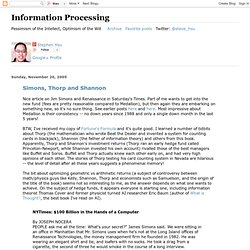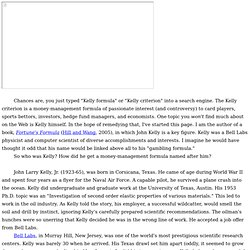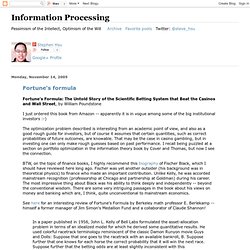

Information Processing. Simons, Thorp and Shannon. Nice article on Jim Simons and Renaissance in Saturday's Times.

Part of me wants to get into the new fund (fees are pretty reasonable compared to Medallion), but then again they are embarking on something new, so it's no sure thing. See earlier posts . Most impressive about Medallion is their consistency -- no down years since 1988 and only a single down month in the last 5 years! BTW, I've received my copy of Fortune's Formula and it's quite good. I learned a number of tidbits about Thorp (the mathematician who wrote Beat the Dealer and invented a system for counting cards in blackjack), Shannon (the father of information theory) and others from this book.
The bit about optimizing geometric vs arithmetic returns (a subject of controversy between math/physics guys like Kelly, Shannon, Thorp and economists such as Samuelson, and the origin of the title of the book) seems not so interesting to me, as the answer depends on what one wants to achieve. John Kelly, Jr. and His Formula. Chances are, you just typed "Kelly formula" or "Kelly criterion" into a search engine.

The Kelly criterion is a money-management formula of passionate interest (and controversy) to card players, sports bettors, investors, hedge fund managers, and economists. One topic you won't find much about on the Web is Kelly himself. In the hope of remedying that, I've started this page. I am the author of a book, Fortune's Formula (Hill and Wang, 2005), in which John Kelly is a key figure. Kelly was a Bell Labs physicist and computer scientist of diverse accomplishments and interests. So who was Kelly? John Larry Kelly, Jr. (1923-65), was born in Corsicana, Texas.
Bell Labs, in Murray Hill, New Jersey, was one of the world's most prestigious scientific research centers. Kelly was "a lot of fun, the life of the party," I was told. Kelly was a chain-smoker. One of Kelly's best friends at Bell Labs was a fellow Texan, Ben Logan. Shannon was in a class by himself. Edge/odds --William Poundstone. Fortune's formula. Fortune's Formula: The Untold Story of the Scientific Betting System that Beat the Casinos and Wall Street, by William Poundstone I just ordered this book from Amazon -- apparently it is in vogue among some of the big institutional investors :-) The optimization problem described is interesting from an academic point of view, and also as a good rough guide for investors, but of course it assumes that certain quantities, such as correct probabilities of future outcomes, are knowable.

That may be the case in casino gambling, but in investing one can only make rough guesses based on past performance. I recall being puzzled at a section on portfolio optimization in the information theory book by Cover and Thomas, but now I see the connection.